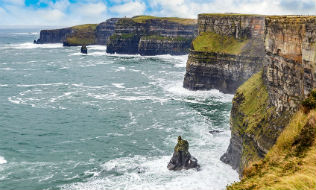

A move by several banks to set up shop in Ireland recently could be the first sign of some of the economic opportunities Britain’s exit from the European Union will bring to the island, an economist suggests.
For Britain’s financial services sector, Brexit will mean an end to the ability to do business in any country in the European economic area without additional authorization. “It means for those activities, some of the banks will have to have a presence in another European country,” says Alison Wrynn, an economist at Ibec, a business group in Dublin.
“And Dublin is one the locations that’s likely to benefit from that,” she adds, citing Paris, Luxembourg and Frankfurt, Germany, as other European financial hubs set to see an influx of activity.
Indeed, the Irish government is hoping for a boon, says Brian Delaney, senior investment consultant at Aon Hewitt in Dublin. “We could see a significant inflow of new jobs in the financial services sector. I think the Irish government is targeting close to 10,000 new jobs.”
Several multinational banks have already been showing interest in Ireland in the wake of Britain’s vote to leave the European Union. TD Securities is expanding its Dublin operations. In May, JPMorgan Chase & Co. bought a building capable of housing 1,000 staff there. In addition, the Bank of America has chosen the Irish capital as the hub for its European Union operations, as has Barclays Bank.
Read: CPPIB to acquire Shell’s stake in Irish natural gas field
The Toronto-Dominion Bank says strong relationships with Ireland make it an attractive jurisdiction. “Our focus is on the establishment of a bond-trading business in Dublin by January 2018, subject to regulatory approval,” says Lynsey Wynberg, manager of corporate and public affairs at TD Bank Group. She adds, however, that the bank does expect London, England, to remain a “big part of our European operations going forward.”
For financial and other multinational businesses, Ireland’s capital looks especially attractive as an alternative to London, says Wrynn. “We’re English-speaking, we’ve got access to the EU market, we have a similar legal system to the U.K., we’re very close in proximity to the U.K. and we also have a very politically stable system going on at the moment with stable policies.”
Some Canadian pension funds have made plays on Ireland’s economic recovery after the global downturn of the late 2000s. In 2014, the Ontario Teachers’ Pension Plan finalized a 20-year contract to operate the Irish National Lottery. And in July, the Canadian Pension Plan Investment Board bought a roughly 45 per cent stake in the Corrib natural gas project on the northwest coast of Ireland.
Those looking to follow the trend towards Ireland by making a play on the Brexit outcome should exercise caution, however, since businesses may end being up able to keep more operations Britain than currently appears likely, says Wrynn.
Read: Latin America remains attractive for investment despite political uncertainty
While the financial sector is likely to gain, Delaney believes Brexit will be negative for Ireland overall, especially in rural areas. With more than $60 billion in goods and services moving back and forth between Ireland and Britain on a yearly basis, currency fluctuations are a significant challenge, he suggests.
Food exports, for example, largely go to Britain. Both higher regulatory restrictions and the anticipated permanent depreciation of the British currency could be a major shock, says Delaney. Ireland got a taste of that currency sting when the pound plummeted in response to the Brexit vote last year.
“If those food exports weren’t able to find a new market to move into, it would be the case that you would essentially have industries wiped out,” says Wrynn.
Ireland’s domestic manufacturing sector has fared quite well in a world where much of the industry has shifted due to globalization, says Wrynn. A hard border between Britain and Ireland, particularly on the island itself between the republic of Ireland and Northern Ireland, could hurt the sector, however.
Many multinational companies treat the entire island as one market, according to Wrynn. “Let’s say you might have one part of your production facility that might be north of the border and then you might have another component of it south of the border. So obviously, then if tariffs came in, that would make all of that very, very difficult.”
“There is the potential for the hard border to be reinstated,” says Delaney, noting the result could be political as well as economic upheaval for the region.
However, one trade element that could be beneficial is energy. With Ireland importing 90 per cent of its energy resources from Britain, the lower pound could cause those prices to fall across the country and give the economy a widespread boost, says Delaney.
Read: Is China becoming more open to institutional investors?
